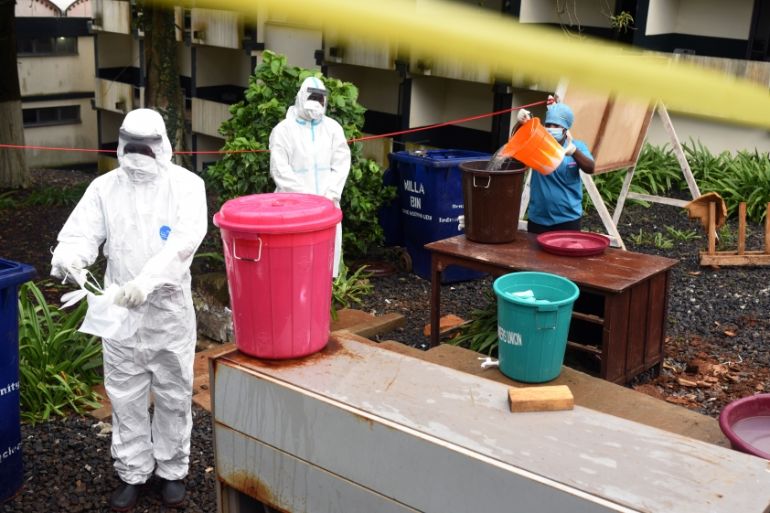Sierra Leone doctors treating COVID-19 patients launch strike
Healthcare workers take action over unpaid bonuses, misuse of funds and lack of resources.

Doctors treating coronavirus patients in Sierra Leone have launched a strike over unpaid bonuses among other grievances.
The strike on Thursday marked an escalation in a row between doctors and the government over what doctors say is a misuse of funds for the coronavirus response in the country and a lack of protection and compensation for health workers.
Keep reading
list of 4 itemsMexico’s teachers seek relief from pandemic-era spike in school robberies
‘A bad chapter’: Tracing the origins of Ecuador’s rise in gang violence
Why is the US economy so resilient?
“No patient showing COVID-like symptoms will be treated by any doctor until we have the support we need,” SK Jusu, the head doctor at Fourah Bay College in the capital, Freetown, told Reuters news agency.
Doctors say they were promised hazard pay for their work during the outbreak, but that the pay has not come.
The number of doctors taking part in the strike was not clear.
At Fourah Bay College, whose dormitories have been transformed into the country’s largest COVID-19 treatment centre, no new patients were accepted on Thursday because the five doctors at the 200-bed facility were all on strike, leaving community health workers and nurses to care for the sick.
There were no critically ill patients on site, Jusu said.
There is now concern that the strike could also lead to a rise in coronavirus cases.
“It is going to be a hell of a problem if this thing isn’t quickly resolved,” said senior community health officer Kiya Conteh who was coordinating lunch deliveries for patients at Fourah Bay College.
“Our people need treatment. If they’re not treated here, what can we expect them to do?”
In a letter addressed to the government, Sierra Leone Medical and Dental Association also protested that authorities had bought about 30 4×4 vehicles for managers from money intended for the fight against the virus rather than drugs and equipment. Government officials could not be reached for comment.
The association has proposed that doctors continue to provide care to non-COVID-19 patients during the strike.
Sierra Leone, which is among the world’s poorest countries, has recorded nearly 1,500 coronavirus cases, including 160 healthcare workers, and 60 related deaths.
Since the outbreak began, about 20 percent of Sierra Leone’s total coronavirus expenditure, or nearly $850,000, went to procuring 30 new SUVs and 230 motorbikes for the Emergency Operations Center, Office of National Security, police force, and military, according to procurement reports released by Sierra Leone’s finance ministry on May 22.
The only medical equipment listed on that procurement report was eight ventilators, which cost the finance ministry approximately $85,285.
Meanwhile, the health ministry’s COVID-19 situation reports routinely describe a lack of funds to pay for contact tracers. Doctors complain of a lack of protective equipment like gloves, masks and coveralls vital to prevent infections spreading from patients to hospital staff.
The country was hard hit by the 2014-16 Ebola epidemic in West Africa during which nearly 4,000 people, including 250 medical workers, died.